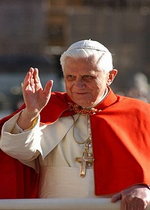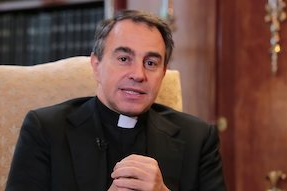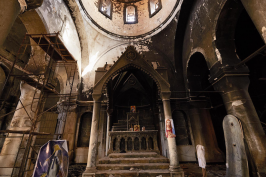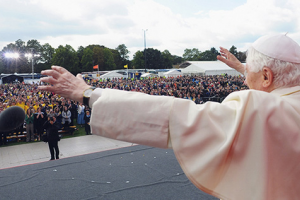Papal Visit (iii) Mass at Bellahouston Park - welcome & homily texts

Pope in Glasgow
At the start of the Mass at Bellahouston Park today, Archbishop Mario Conti, as the Archbishop of the diocese in which the celebration took place, formally welcomed the Pope to Scotland and the UK on behalf of the Catholic Church in these islands. saying:
Most Holy Father, Praised be Jesus Christ!
Welcome to Glasgow, entitled by one of your predecessors Specialis Filia Romanae Ecclesiae - the Special Daughter of the Roman Church. Welcome to Scotland, to the whole of which another of your predecessors extended that coveted title. Welcome to the United Kingdom, whose monarch earlier today in the name of all its citizens welcomed you. We, Holy Father, echo that welcome; we form a community of faith obedient to the Gospel, which has been preached in these islands for over fifteen centuries - before the land to our south became England, and that on which you stand Scotland.
You come to us on the actual feast of our first-named missionary Saint Ninian, who, according to a reliable tradition, received his education in Rome and came back ordained to proclaim the Gospel of Christ and to establish His Church.
From Rome also came Saint Augustine, sent by Pope Gregory the Great, your predecessor, whose arrival in Kent coincided with the death on the Holy Island of Iona of Saint Columba, who, with his fellow Irish missionaries, evangelised our Scottish Highlands and Islands. Already a British missionary had taken the faith from these shores to those of Ireland whose citizens recognise in Saint Patrick their great apostle.
Monastic life flourished in our lands, giving us such great saints as Aidan of Lindisfarne and the Venerable Bede.
Centuries later, at the time of the Reformation, devoted men and women were martyred on account of their faith. In this very city Saint John Ogilvie was hanged for his allegiance to the Holy See. Holy Father, in addition to Saint Andrew its patron, Scotland holds dear the memory of a saintly queen, Margaret, whose son David revived the ancient bishoprics. In England, and well beyond, men and women admire Thomas More, Chancellor of the Realm, who suffered death for obedience to his conscience; while another great Englishman whom your holiness means to beatify, John Henry Newman, preached on the primacy of a conscience responsive to the truth.
Welcome, Holy Father, to this spot where your venerable predecessor John Paul II challenged us for the future to walk hand in hand, and whereby we have created a warmth of friendship with which Christians throughout the United Kingdom embrace you today in your visit to the lands we love and the communities we serve.
Finally we welcome you, Holy Father, as the Servant of Christ Jesus and the Servant of the Servants of God.
Cead Mille Failte: A hundred thousand welcomes!
Pope Benedict's Homily
Dear Brothers and Sisters in Christ,
"The Kingdom of God is very near to you!" (Lk 10:9). With these words of the Gospel we have just heard, I greet all of you with great affection in the Lord. Truly the Lord's Kingdom is already inour midst! At this Eucharistic celebration in which the Church in Scotland gathers around the altar in union withthe Successor of Peter, let us reaffirm our faith in Christ's word and our hope - a hope which never disappoints - in his promises! I warmly greet Cardinal O'Brien and the Scottish Bishops; I thank in particular Archbishop Conti for hiskind words of welcome on your behalf; and I express my deep gratitude for the work that the British and Scottish Governments and the Glasgow city fathers have done to make this occasion possible.
Today's Gospel reminds us that Christ continues to send his disciples into the world in order to proclaim the coming of his Kingdom and to bring his peace into the world, beginning house by house, family by family, town by town. I have come as a herald of that peace to you, the spiritual children of Saint Andrew and to confirm you in the faith of Peter (cf. Lk 22:32). It is with some emotion that I address you, not far from the spot where my beloved predecessor Pope John Paul II celebrated Mass nearly thirty years ago with you and was welcomed by the largest crowd ever gathered in Scottish history.
Much has happened in Scotland and in the Church in this country since that historic visit. I note with great satisfaction how Pope John Paul's call to you to walk hand in hand with your fellow Christians has led to greater trust and friendship with the members of the Church of Scotland, the Scottish Episcopal Churchand others. Let me encourage you to continue to pray and work with them in building a brighter future for Scotland based upon our common Christian heritage.
In today's first reading we heard Saint Paul appeal to the Romans to acknowledge that, as members of Christ's body, we belong to each other (cf. Rom 12:5) and to live in respect and mutual love.
In that spirit I greet the ecumenical representatives who honour us by their presence. This year marks the 450th anniversary of the Reformation Parliament, but also the 100th anniversary of the World Missionary Conference in Edinburgh, which is widely acknowledged to mark the birth of the modern ecumenical movement. Let us give thanks to God for the promise which ecumenical understanding and cooperation represents for a united witness to the saving truth of God's word in today's rapidly changing society.
Among the differing gifts which Saint Paul lists for the building up of the Church is that of teaching (cf. Rom 12:7). The preaching of the Gospel has always been accompanied by concern for the word: the inspired word of God and the culture in which that word takes root and flourishes. Here in Scotland, I think of the three medieval universities founded here by the popes, including that of Saint Andrews which is beginning to mark the 600th anniversary of its foundation. In the last 30 years and with the assistance of civil authorities, Scottish Catholic schools have taken up the challenge of providing an integral education to greater numbers of students, and this has helped young people not only along the path of spiritual and human growth, but also in entering the professions and public life.
This is a sign of great hope for the Church, and I encourage the Catholic professionals, politicians and teachers of Scotland never to lose sight of their calling to use their talents and experience in the service of the faith, engaging contemporary Scottish culture at every level.
The evangelization of culture is all the more important in our times, when a "dictatorship of relativism" threatens to obscure the unchanging truth about man's nature, his destiny and his ultimate good. There are some who now seek to exclude religious belief from public discourse, to privatize it or even to paint it as a threat to equality and liberty. Yet religion is in fact a guarantee of authentic liberty and respect, leading us to look upon every person as a brother or sister.
For this reason I appeal in particular to you, the lay faithful, in accordance with your baptismal calling and mission, not only to be examples of faith in public, but also to put the case for the promotion of faith's wisdom and vision in the public forum. Society today needs clear voices which propose our right to live, not in a jungle of self-destructive and arbitrary freedoms, but in a society which works for the true welfare of its citizens and offers them guidance and protection in the face of their weakness and fragility. Do not be afraid to take up this service to your brothers and sisters, and to the future of your beloved nation.
Saint Ninian, whose feast we celebrate today, was himself unafraid to be a lone voice. In the footsteps of the disciples whom our Lord sent forth before him, Ninian was one of the very first Catholic missionaries to bring his fellow Britons the good news of Jesus Christ. His mission church in Galloway became a centre for the first evangelization of this country. That work was later taken up by Saint Mungo, Glasgow's own patron, and by other saints, the greatest of whom must include Saint Columba and Saint Margaret.
Inspired by them, many men and women have laboured over many centuries to hand down the faith to you. Strive to be worthy of this great tradition! Let the exhortation of Saint Paul in the first reading be your constant inspiration: "Do not lag in zeal, be ardent in spirit, serve the Lord. Rejoice in hope, be patient in suffering and persevere in prayer" (cf. Rom 12:11-12).
I would now like to address a special word to the bishops of Scotland. Dear brothers, let me encourage you in your pastoral leadership of the Catholics of Scotland. As you know, one of your first pastoral duties is to your priests (cf. Presbyterorum Ordinis, 7) and to their sanctification. As they are alter Christus to the Catholic community, so you are to them. Live to the full the charity that flows from Christ, in your brotherly ministry towards your priests, collaborating with them all, and in particular with those who have little contact with their fellow priests. Pray with them for vocations, that the Lord of the harvest will send labourers to his harvest (cf. Lk 10:2). Just as the Eucharist makes the Church, so the priesthood is central to the life of the Church. Engage yourselves personally in forming your priests as a body of men who inspire others to dedicate themselves completely to the service of Almighty God.
Have a care also for your deacons, whose ministry of service is associated in a particular way with that of the order of bishops. Be a father and a guide in holiness for them, encouraging them to grow in knowledge and wisdom in carrying out the mission of herald to which they have been called.
Dear priests of Scotland, you are called to holiness and to serve God's people by modelling your lives on the mystery of the Lord's cross. Preach the Gospel with a pure heart and a clear conscience.
Dedicate yourselves to God alone and you will become shining examples to young men of a holy, simple and joyful life: they, in their turn, will surely wish to join you in your single-minded service of God's people. May the example of Saint John Ogilvie, dedicated, selfless and brave, inspire all of you. Similarly, let me encourage you, the monks, nuns and religious of Scotland to be a light on a hilltop, living an authentic Christian life of prayer and action that witnesses in a luminous way to the power of the Gospel.
Finally, I would like to say a word to you, my dear young Catholics of Scotland. I urge you to lead lives worthy of our Lord (cf. Eph 4:1) and of yourselves. There are many temptations placed before you every day - drugs, money, sex, pornography, alcohol - which the world tells you will bring you happiness, yet these things are destructive and divisive.
There is only one thing which lasts: the love of Jesus Christ personally for each one of you. Search for him, know him and love him, and he will set you free from slavery to the glittering but superficial existence frequently proposed by today's society. Put aside what is worthless and learn of your own dignity as children of God. In today's Gospel, Jesus asks us to pray for vocations: I pray that many of you will know and love Jesus Christ and, through that encounter, will dedicate yourselves completely to God, especially those of you who are called to the priesthood and religious life. This is the challenge the Lord gives to you today: the Church now belongs to you!
Dear friends, I express once more my joy at celebrating this Mass with you. I am happy to assure you of my prayers in the ancient language of your country: Sìth agus beannachd Dhe dhuibh uile; Dia bhi timcheall oirbh; agus gum beannaicheadh Dia Alba. God's peace and blessing to you all; God surround you; and may God bless the people of Scotland!
Source: SCMO
To watch Pope Benedict's visit in real time, click on: www.fco.gov.uk/en/news/latest-news/?view=News&id=22871314


















